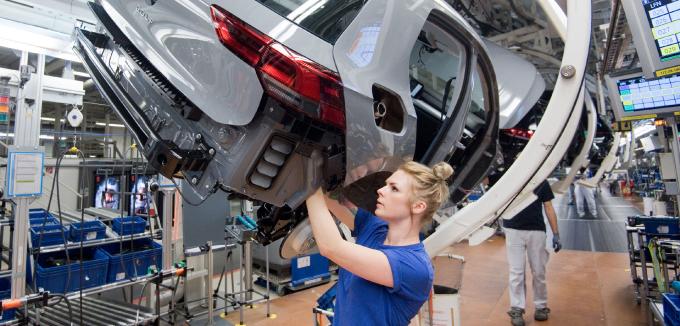Julian Stratenschulte / DPA
Production of the VW Golf 8 at the Volkswagen plant in Wolfsburg
What is wrong with our government? The economic stimulus program was barely there released , the SPD politicians in particular celebrated as if they had secured the German economy at least five years of recovery. And that from a purely tactical point of view. Without substantive justification. A closer look at the content of the program reveals a serious deficit in industrial and economic competence and responsibility. Those who should actually have this competence obviously no longer penetrate.
Christian Malorny

Christian Malorny is the global car director of the management consultancy Kearney.
What happened? The government has announced the spending of (another) 130 billion euros at the expense of taxpayers, especially the younger generation. It distributes borrowed money. The economic crisis, which is personally severe for many citizens, continues; and that even in the CDU some people came up with anti-business comments in the run-up to the economic stimulus program, little can be expected for the future.
The lack of industrial responsibility and also the government ‘s competence are most evident in the example of car industry. According to Kearney calculations, around 15 percent of the population will be in the next 18 months Jobs at stake in the German auto industry, that’s about 130,000 jobs. The short-time work benefit, the extension of which must be decided in autumn 2020, does not offer long-term protection. And it also becomes understandable that IG Metall at a distance goes to the SPD if the Social Democrats distance themselves from the car industry.
Even in the financial crisis in 2009, the auto industry saw a disproportionate number of bankruptcies compared to other industrial sectors. The industry is strongly characterized by medium-sized companies; 55 percent of the companies only generate up to 2 million euros in sales, another 32 percent between 2 and 50 million. The scrappage bonus decided in 2009 limited the bankruptcy pressure and reduced it to the usual level.
Germany, of all people, is doing it wrong
The current Fight for the purchase bonus has a long history. It started in April 2016. The federal government and the automotive industry agreed at the time that buyers of one Electric vehicle Receive 4,000 euros in funding. Even then, the government did not realize that such a premium would only really work if it was clear that it was pure start-up financing for a new, still expensive technology – and that it could and will specifically deactivate this premium again .
In countries without an auto industry, such as Norway and Denmark, which is repeatedly shown as a role model, this works very easily and without distortion. Germany, however, has an auto industry, which is also the world’s leading industry. And Germany of all people is doing it wrong. The federal government is simply giving customers more and more bonuses when they are not buying – and is surprised if they still do not start out on the premiums as desired.
But one thing at a time: In theory, the federal government and the automotive industry could and should lower premiums and ultimately discontinue them altogether with increasing sales and unit costs of electric cars. So far, however, no one has been able to say reliably how the costs for batteries and especially the costs for hydrogen technology will develop.
The only thing that is certain is that electric cars will continue to be significantly more expensive than those with combustion engines over the next few years. And the citizen to whom politics is actually committed? He hardly buys the electric vehicles, waits for a functioning charging infrastructure, a greater range of the cars and maybe also for the next increase in premiums or lower taxes. He makes rational decisions instead of following an ideologically desired behavior.
Page 1 of 3

